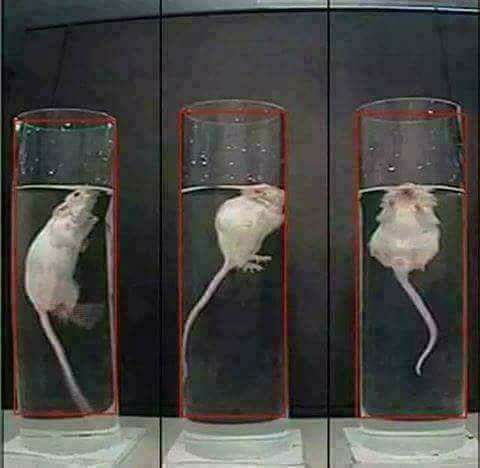
In the 1950s, Professor Curt Richter of Johns Hopkins University conducted a morbid but still interesting lab experiment with domesticated and wild rats to test how long they could tread water.

He first took a dozen domesticated rats, put them into jars half-filled with water, and watched them drown. The idea was to measure the amount of time they swam before they gave up and drowned. Richter noted that the first rat swam around excitedly on the surface for a very short time, then dove to the bottom, where it began to swim around, nosing its way along the glass wall. It died two minutes later.
The other domesticated rats swam around a bit longer. On average, they’d give up and sink after 15 minutes.
Now came the wild rats, renowned for their swimming ability. The ones Richter used had been recently trapped and were fierce and aggressive. So one by one, he dropped them into the water. And one by one, they surprised him: Within minutes of entering the water, all 34 died.
Then Richter tested rats again, but this time with a twist.
Right before they gave up due to exhaustion, Richter and his researchers would scoop them out, dry them off, let them rest for a few minutes – and put them back in the water for a second round.
In this second try, how long do you think they lasted? Remember – they had just swum until failure right before this.
How long do you think? Another 5 minutes? 10 minutes? 15 minutes?
Actually, not even that close. It was much, much longer.
The average time the rats stayed treading in the water was 60 hours!
Yes, that’s not a typo. It was 60 – not minutes, but hours – of swimming.
Richter’s results showed that removing or “saving” the rats just before drowning allowed those same rats to swim approximately 240 times longer the next time they were placed in the bucket.
There was even one mouse that lasted for about 81 hours.
The conclusion drawn was that since the rats felt encouragement that they would eventually be rescued, they could push their bodies way past what they previously thought impossible. Thus, this story is found as a sign of the importance of hope and optimism by help from outside agents.
Most people can do more when they find encouragement and stop when they do not have enough appreciation, motivation, and hope. God has hardwired us as humans to feel this. Encouragement should be a regular, daily part of our lives as Christians. 1 Thessalonians 5:11 states, “Therefore encourage one another and build one another up, just as you are doing.” [ESV]
When we show the love of Jesus Christ to others, we go far beyond the simple act we are performing for them. It’s more than just a meal, a ride to work, a donation to help them cover their bills this month, or a place to stay overnight during tough times. It is affecting the less fortunate in ways that they probably don’t even realize! A little can go a long way to boosting someone’s overall capacity for pressing on. As the Body of Christ, we can give God’s strength to those who are weak.
As Jesus commanded us at the end of the Good Samaritan story, “Go and do likewise!” [Luke 10:37b]
Sources:

0 Comments